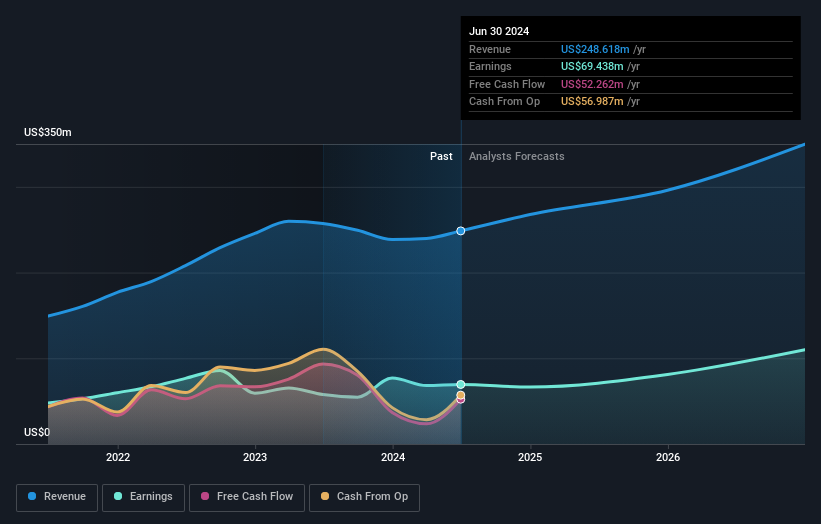Metropolitan Bank Holding Corp.'s (NYSE:MCB) high institutional ownership speaks for itself as stock continues to impress, up 10% over last week
Key Insights
- Institutions' substantial holdings in Metropolitan Bank Holding implies that they have significant influence over the company's share price
- A total of 12 investors have a majority stake in the company with 50% ownership
- Insiders have been selling lately
If you want to know who really controls Metropolitan Bank Holding Corp. (NYSE:MCB), then you'll have to look at the makeup of its share registry. The group holding the most number of shares in the company, around 74% to be precise, is institutions. In other words, the group stands to gain the most (or lose the most) from their investment into the company.
And as as result, institutional investors reaped the most rewards after the company's stock price gained 10% last week. One-year return to shareholders is currently 75% and last week’s gain was the icing on the cake.
Let's take a closer look to see what the different types of shareholders can tell us about Metropolitan Bank Holding.
See our latest analysis for Metropolitan Bank Holding

What Does The Institutional Ownership Tell Us About Metropolitan Bank Holding?
Institutions typically measure themselves against a benchmark when reporting to their own investors, so they often become more enthusiastic about a stock once it's included in a major index. We would expect most companies to have some institutions on the register, especially if they are growing.
As you can see, institutional investors have a fair amount of stake in Metropolitan Bank Holding. This implies the analysts working for those institutions have looked at the stock and they like it. But just like anyone else, they could be wrong. If multiple institutions change their view on a stock at the same time, you could see the share price drop fast. It's therefore worth looking at Metropolitan Bank Holding's earnings history below. Of course, the future is what really matters.

Since institutional investors own more than half the issued stock, the board will likely have to pay attention to their preferences. Hedge funds don't have many shares in Metropolitan Bank Holding. Our data shows that FMR LLC is the largest shareholder with 9.0% of shares outstanding. Meanwhile, the second and third largest shareholders, hold 8.3% and 6.8%, of the shares outstanding, respectively. Additionally, the company's CEO Mark DeFazio directly holds 0.9% of the total shares outstanding.
Looking at the shareholder registry, we can see that 50% of the ownership is controlled by the top 12 shareholders, meaning that no single shareholder has a majority interest in the ownership.
While it makes sense to study institutional ownership data for a company, it also makes sense to study analyst sentiments to know which way the wind is blowing. There are a reasonable number of analysts covering the stock, so it might be useful to find out their aggregate view on the future.
Insider Ownership Of Metropolitan Bank Holding
While the precise definition of an insider can be subjective, almost everyone considers board members to be insiders. The company management answer to the board and the latter should represent the interests of shareholders. Notably, sometimes top-level managers are on the board themselves.
I generally consider insider ownership to be a good thing. However, on some occasions it makes it more difficult for other shareholders to hold the board accountable for decisions.
Shareholders would probably be interested to learn that insiders own shares in Metropolitan Bank Holding Corp.. In their own names, insiders own US$31m worth of stock in the US$660m company. It is good to see some investment by insiders, but it might be worth checking if those insiders have been buying.
General Public Ownership
The general public, who are usually individual investors, hold a 14% stake in Metropolitan Bank Holding. While this size of ownership may not be enough to sway a policy decision in their favour, they can still make a collective impact on company policies.
Private Equity Ownership
With a stake of 6.8%, private equity firms could influence the Metropolitan Bank Holding board. Sometimes we see private equity stick around for the long term, but generally speaking they have a shorter investment horizon and -- as the name suggests -- don't invest in public companies much. After some time they may look to sell and redeploy capital elsewhere.
Next Steps:
While it is well worth considering the different groups that own a company, there are other factors that are even more important. Consider risks, for instance. Every company has them, and we've spotted 1 warning sign for Metropolitan Bank Holding you should know about.
If you are like me, you may want to think about whether this company will grow or shrink. Luckily, you can check this free report showing analyst forecasts for its future.
NB: Figures in this article are calculated using data from the last twelve months, which refer to the 12-month period ending on the last date of the month the financial statement is dated. This may not be consistent with full year annual report figures.
Have feedback on this article? Concerned about the content? Get in touch with us directly. Alternatively, email editorial-team (at) simplywallst.com.
This article by Simply Wall St is general in nature. We provide commentary based on historical data and analyst forecasts only using an unbiased methodology and our articles are not intended to be financial advice. It does not constitute a recommendation to buy or sell any stock, and does not take account of your objectives, or your financial situation. We aim to bring you long-term focused analysis driven by fundamental data. Note that our analysis may not factor in the latest price-sensitive company announcements or qualitative material. Simply Wall St has no position in any stocks mentioned.
 Index Options
Index Options CME Group
CME Group Nasdaq
Nasdaq Cboe
Cboe TradingView
TradingView Wall Street Journal
Wall Street Journal